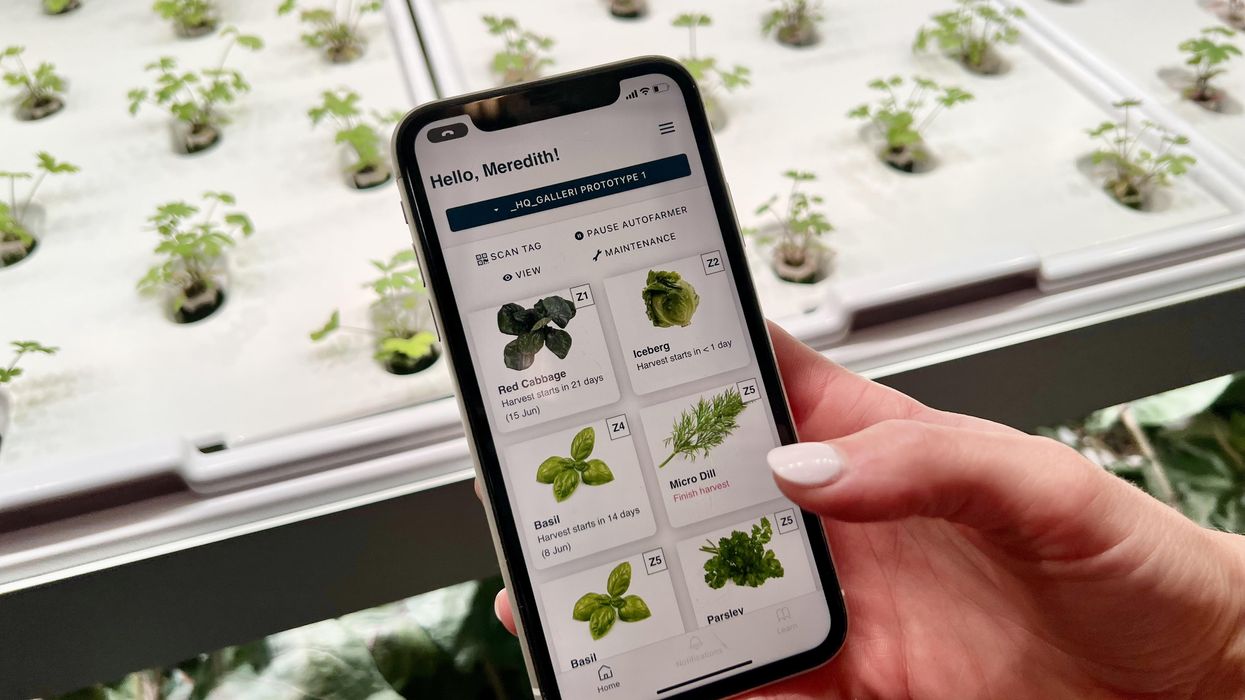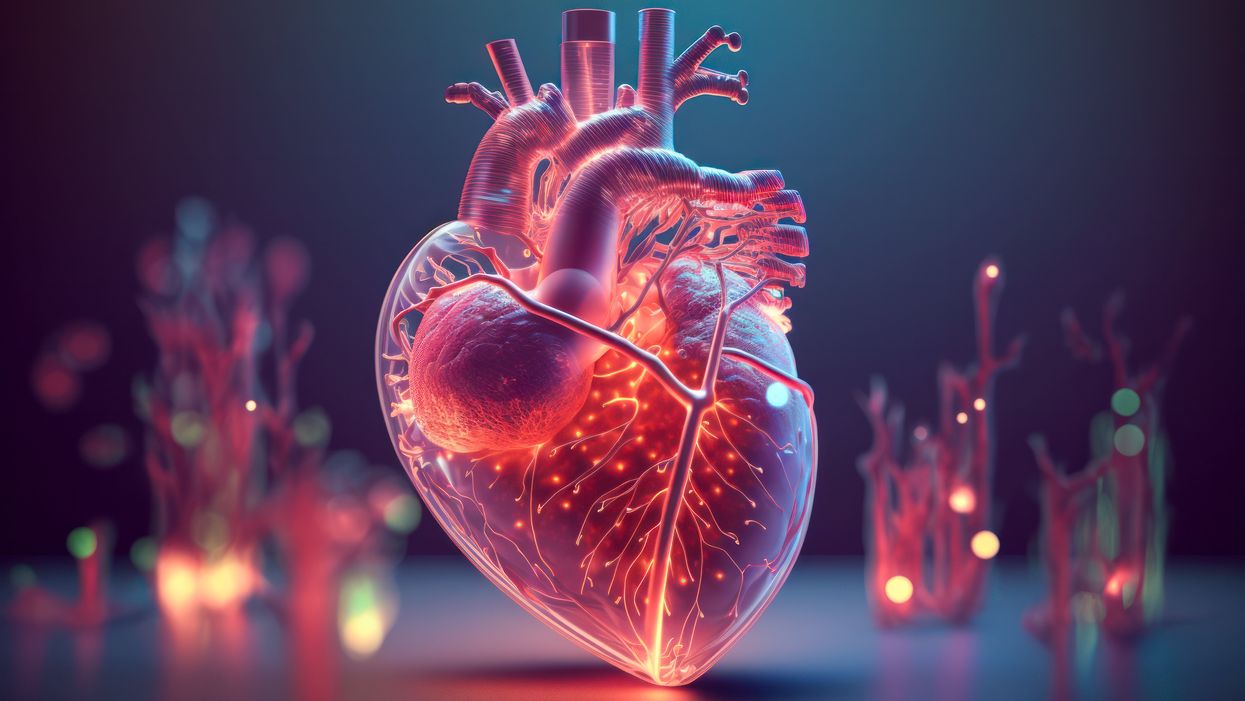Should We Use Technologies to Enhance Morality?

Should we welcome biomedical technologies that could enhance our ability to tell right from wrong and improve behaviors that are considered immoral such as dishonesty, prejudice and antisocial aggression?
Our moral ‘hardware’ evolved over 100,000 years ago while humans were still scratching the savannah. The perils we encountered back then were radically different from those that confront us now. To survive and flourish in the face of complex future challenges our archaic operating systems might need an upgrade – in non-traditional ways.
Morality refers to standards of right and wrong when it comes to our beliefs, behaviors, and intentions. Broadly, moral enhancement is the use of biomedical technology to improve moral functioning. This could include augmenting empathy, altruism, or moral reasoning, or curbing antisocial traits like outgroup bias and aggression.
The claims related to moral enhancement are grand and polarizing: it’s been both tendered as a solution to humanity’s existential crises and bluntly dismissed as an armchair hypothesis. So, does the concept have any purchase? The answer leans heavily on our definition and expectations.
One issue is that the debate is often carved up in dichotomies – is moral enhancement feasible or unfeasible? Permissible or impermissible? Fact or fiction? On it goes. While these gesture at imperatives, trading in absolutes blurs the realities at hand. A sensible approach must resist extremes and recognize that moral disrupters are already here.
We know that existing interventions, whether they occur unknowingly or on purpose, have the power to modify moral dispositions in ways both good and bad. For instance, neurotoxins can promote antisocial behavior. The ‘lead-crime hypothesis’ links childhood lead-exposure to impulsivity, antisocial aggression, and various other problems. Mercury has been associated with cognitive deficits, which might impair moral reasoning and judgement. It’s well documented that alcohol makes people more prone to violence.
So, what about positive drivers? Here’s where it gets more tangled.
Medicine has long treated psychiatric disorders with drugs like sedatives and antipsychotics. However, there’s short mention of morality in the Diagnostic and Statistical Manual of Mental Disorders (DSM) despite the moral merits of pharmacotherapy – these effects are implicit and indirect. Such cases are regarded as treatments rather than enhancements.
It would be dangerously myopic to assume that moral augmentation is somehow beyond reach.
Conventionally, an enhancement must go beyond what is ‘normal,’ species-typical, or medically necessary – this is known as the ‘treatment-enhancement distinction.’ But boundaries of health and disease are fluid, so whether we call a procedure ‘moral enhancement’ or ‘medical treatment’ is liable to change with shifts in social values, expert opinions, and clinical practices.
Human enhancements are already used for a range of purported benefits: caffeine, smart drugs, and other supplements to boost cognitive performance; cosmetic procedures for aesthetic reasons; and steroids and stimulants for physical advantage. More boldly, cyborgs like Moon Ribas and Neil Harbisson are pushing transpecies boundaries with new kinds of sensory perception. It would be dangerously myopic to assume that moral augmentation is somehow beyond reach.
How might it work?
One possibility for shaping moral temperaments is with neurostimulation devices. These use electrodes to deliver a low-intensity current that alters the electromagnetic activity of specific neural regions. For instance, transcranial Direct Current Stimulation (tDCS) can target parts of the brain involved in self-awareness, moral judgement, and emotional decision-making. It’s been shown to increase empathy and valued-based learning, and decrease aggression and risk-taking behavior. Many countries already use tDCS to treat pain and depression, but evidence for enhancement effects on healthy subjects is mixed.
Another suggestion is targeting neuromodulators like serotonin and dopamine. Serotonin is linked to prosocial attributes like trust, fairness, and cooperation, but low activity is thought to motivate desires for revenge and harming others. It’s not as simple as indiscriminately boosting brain chemicals though. While serotonin is amenable to SSRIs, precise levels are difficult to measure and track, and there’s no scientific consensus on the “optimum” amount or on whether such a value even exists. Fluctuations due to lifestyle factors such as diet, stress, and exercise add further complexity. Currently, more research is needed on the significance of neuromodulators and their network dynamics across the moral landscape.
There are a range of other prospects. The ‘love drugs’ oxytocin and MDMA mediate pair bonding, cooperation, and social attachment, although some studies suggest that people with high levels of oxytocin are more aggressive toward outsiders. Lithium is a mood stabilizer that has been shown to reduce aggression in prison populations; beta-blockers like propranolol and the supplement omega-3 have similar effects. Increasingly, brain-computer interfaces augur a world of brave possibilities. Such appeals are not without limitations, but they indicate some ways that external tools can positively nudge our moral sentiments.
Who needs morally enhancing?
A common worry is that enhancement technologies could be weaponized for social control by authoritarian regimes, or used like the oppressive eugenics of the early 20th century. Fortunately, the realities are far more mundane and such dystopian visions are fantastical. So, what are some actual possibilities?
Some researchers suggest that neurotechnologies could help to reactivate brain regions of those suffering from moral pathologies, including healthy people with psychopathic traits (like a lack of empathy). Another proposal is using such technology on young people with conduct problems to prevent serious disorders in adulthood.
Most of us aren’t always as ethical as we would like – given the option of ‘priming’ yourself to act in consistent accord with your higher values, would you take it?
A question is whether these kinds of interventions should be compulsory for dangerous criminals. On the other hand, a voluntary treatment for inmates wouldn’t be so different from existing incentive schemes. For instance, some U.S. jurisdictions already offer drug treatment programs in exchange for early release or instead of prison time. Then there’s the difficult question of how we should treat non-criminal but potentially harmful ‘successful’ psychopaths.
Others argue that if virtues have a genetic component, there is no technological reason why present practices of embryo screening for genetic diseases couldn’t also be used for selecting socially beneficial traits.
Perhaps the most immediate scenario is a kind of voluntary moral therapy, which would use biomedicine to facilitate ideal brain-states to augment traditional psychotherapy. Most of us aren’t always as ethical as we would like – given the option of ‘priming’ yourself to act in consistent accord with your higher values, would you take it? Approaches like neurofeedback and psychedelic-assisted therapy could prove helpful.
What are the challenges?
A general challenge is that of setting. Morality is context dependent; what’s good in one environment may be bad in another and vice versa, so we don’t want to throw out the baby with the bathwater. Of course, common sense tells us that some tendencies are more socially desirable than others: fairness, altruism, and openness are clearly preferred over aggression, dishonesty, and prejudice.
One argument is that remoulding ‘brute impulses’ via biology would not count as moral enhancement. This view claims that for an action to truly count as moral it must involve cognition – reasoning, deliberation, judgement – as a necessary part of moral behavior. Critics argue that we should be concerned more with ends rather than means, so ultimately it’s outcomes that matter most.
Another worry is that modifying one biological aspect will have adverse knock-on effects for other valuable traits. Certainly, we must be careful about the network impacts of any intervention. But all stimuli have distributed effects on the body, so it’s really a matter of weighing up the cost/benefit trade-offs as in any standard medical decision.
Is it ethical?
Our values form a big part of who we are – some bioethicists argue that altering morality would pose a threat to character and personal identity. Another claim is that moral enhancement would compromise autonomy by limiting a person’s range of choices and curbing their ‘freedom to fall.’ Any intervention must consider the potential impacts on selfhood and personal liberty, in addition to the wider social implications.
This includes the importance of social and genetic diversity, which is closely tied to considerations of fairness, equality, and opportunity. The history of psychiatry is rife with examples of systematic oppression, like ‘drapetomania’ – the spurious mental illness that was thought to cause African slaves’ desire to flee captivity. Advocates for using moral enhancement technologies to help kids with conduct problems should be mindful that they disproportionately come from low-income communities. We must ensure that any habilitative practice doesn’t perpetuate harmful prejudices by unfairly targeting marginalized people.
Human capacities are the result of environmental influences, and external conditions still coax our biology in unknown ways. Status quo bias for ‘letting nature take its course’ may actually be worse long term – failing to utilize technology for human development may do more harm than good.
Then, there are concerns that morally-enhanced persons would be vulnerable to predation by those who deliberately avoid moral therapies. This relates to what’s been dubbed the ‘bootstrapping problem’: would-be moral enhancement candidates are the types of individuals that benefit from not being morally enhanced. Imagine if every senator was asked to undergo an honesty-boosting procedure prior to entering public office – would they go willingly? Then again, perhaps a technological truth-serum wouldn’t be such a bad requisite for those in positions of stern social consequence.
Advocates argue that biomedical moral betterment would simply offer another means of pursuing the same goals as fixed social mechanisms like religion, education, and community, and non-invasive therapies like cognitive-behavior therapy and meditation. It’s even possible that technological efforts would be more effective. After all, human capacities are the result of environmental influences, and external conditions still coax our biology in unknown ways. Status quo bias for ‘letting nature take its course’ may actually be worse long term – failing to utilize technology for human development may do more harm than good. If we can safely improve ourselves in direct and deliberate ways then there’s no morally significant difference whether this happens via conventional methods or new technology.
Future prospects
Where speculation about human enhancement has led to hype and technophilia, many bioethicists urge restraint. We can be grounded in current science while anticipating feasible medium-term prospects. It’s unlikely moral enhancement heralds any metamorphic post-human utopia (or dystopia), but that doesn’t mean dismissing its transformative potential. In one sense, we should be wary of transhumanist fervour about the salvatory promise of new technology. By the same token we must resist technofear and alarmist efforts to balk social and scientific progress. Emerging methods will continue to shape morality in subtle and not-so-subtle ways – the critical steps are spotting and scaffolding these with robust ethical discussion, public engagement, and reasonable policy options. Steering a bright and judicious course requires that we pilot the possibilities of morally-disruptive technologies.
Autonomous, indoor farming gives a boost to crops
Artificial Intelligence is already helping to grow some of the food we eat.
The glass-encased cabinet looks like a display meant to hold reasonably priced watches, or drugstore beauty creams shipped from France. But instead of this stagnant merchandise, each of its five shelves is overgrown with leaves — moss-soft pea sprouts, spikes of Lolla rosa lettuces, pale bok choy, dark kale, purple basil or red-veined sorrel or green wisps of dill. The glass structure isn’t a cabinet, but rather a “micro farm.”
The gadget is on display at the Richmond, Virginia headquarters of Babylon Micro-Farms, a company that aims to make indoor farming in the U.S. more accessible and sustainable. Babylon’s soilless hydroponic growing system, which feeds plants via nutrient-enriched water, allows chefs on cruise ships, cafeterias and elsewhere to provide home-grown produce to patrons, just seconds after it’s harvested. Currently, there are over 200 functioning systems, either sold or leased to customers, and more of them are on the way.
The chef-farmers choose from among 45 types of herb and leafy-greens seeds, plop them into grow trays, and a few weeks later they pick and serve. While success is predicated on at least a small amount of these humans’ care, the systems are autonomously surveilled round-the-clock from Babylon’s base of operations. And artificial intelligence is helping to run the show.
Babylon piloted the use of specialized cameras that take pictures in different spectrums to gather some less-obvious visual data about plants’ wellbeing and alert people if something seems off.
Imagine consistently perfect greens and tomatoes and strawberries, grown hyper-locally, using less water, without chemicals or environmental contaminants. This is the hefty promise of controlled environment agriculture (CEA) — basically, indoor farms that can be hydroponic, aeroponic (plant roots are suspended and fed through misting), or aquaponic (where fish play a role in fertilizing vegetables). But whether they grow 4,160 leafy-green servings per year, like one Babylon farm, or millions of servings, like some of the large, centralized facilities starting to supply supermarkets across the U.S., they seek to minimize failure as much as possible.
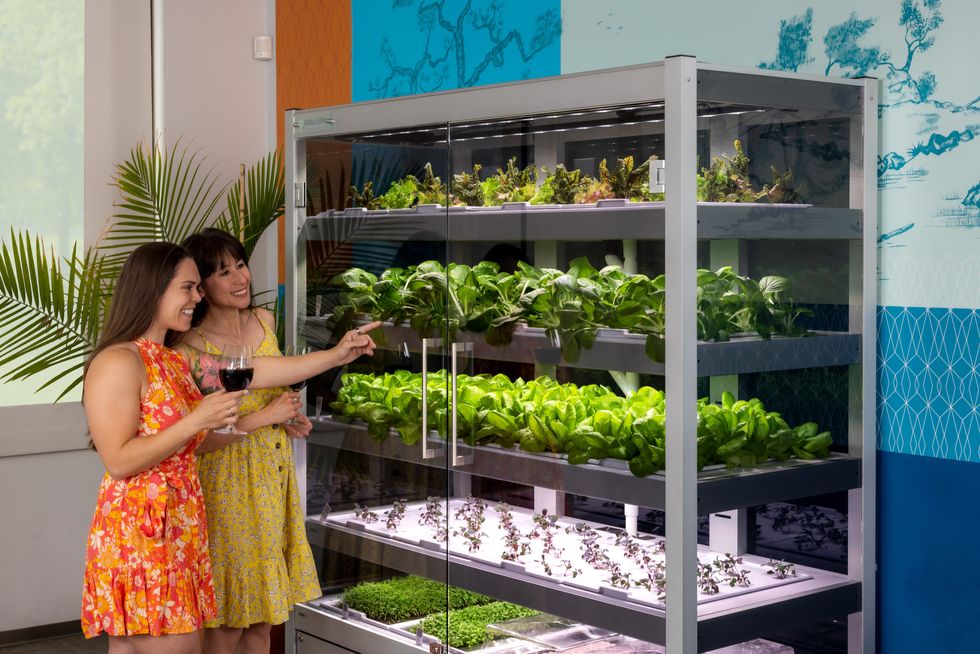
Babylon’s soilless hydroponic growing system
Courtesy Babylon Micro-Farms
Here, AI is starting to play a pivotal role. CEA growers use it to help “make sense of what’s happening” to the plants in their care, says Scott Lowman, vice president of applied research at the Institute for Advanced Learning and Research (IALR) in Virginia, a state that’s investing heavily in CEA companies. And although these companies say they’re not aiming for a future with zero human employees, AI is certainly poised to take a lot of human farming intervention out of the equation — for better and worse.
Most of these companies are compiling their own data sets to identify anything that might block the success of their systems. Babylon had already integrated sensor data into its farms to measure heat and humidity, the nutrient content of water, and the amount of light plants receive. Last year, they got a National Science Foundation grant that allowed them to pilot the use of specialized cameras that take pictures in different spectrums to gather some less-obvious visual data about plants’ wellbeing and alert people if something seems off. “Will this plant be healthy tomorrow? Are there things…that the human eye can't see that the plant starts expressing?” says Amandeep Ratte, the company’s head of data science. “If our system can say, Hey, this plant is unhealthy, we can reach out to [users] preemptively about what they’re doing wrong, or is there a disease at the farm?” Ratte says. The earlier the better, to avoid crop failures.
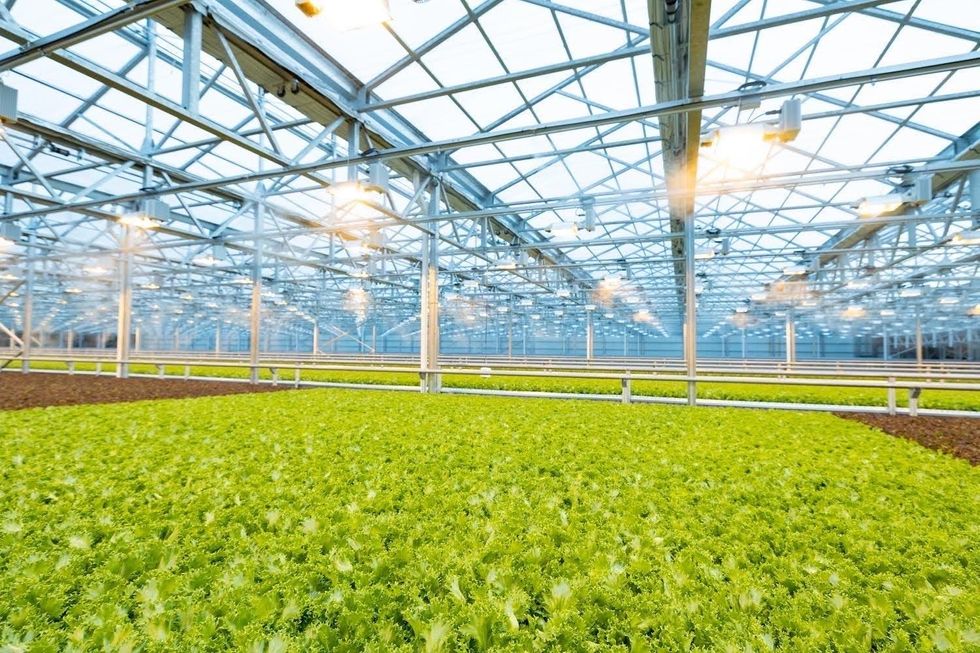
Natural light accounts for 70 percent of Greenswell Growers’ energy use on a sunny day.
Courtesy Greenswell Growers
IALR’s Lowman says that other CEA companies are developing their AI systems to account for the different crops they grow — lettuces come in all shapes and sizes, after all, and each has different growing needs than, for example, tomatoes. The ways they run their operations differs also. Babylon is unusual in its decentralized structure. But centralized growing systems with one main location have variabilities, too. AeroFarms, which recently declared bankruptcy but will continue to run its 140,000-square foot vertical operation in Danville, Virginia, is entirely enclosed and reliant on the intense violet glow of grow lights to produce microgreens.
Different companies have different data needs. What data is essential to AeroFarms isn’t quite the same as for Greenswell Growers located in Goochland County, Virginia. Raising four kinds of lettuce in a 77,000-square-foot automated hydroponic greenhouse, the vagaries of naturally available light, which accounts for 70 percent of Greenswell’s energy use on a sunny day, affect operations. Their tech needs to account for “outside weather impacts,” says president Carl Gupton. “What adjustments do we have to make inside of the greenhouse to offset what's going on outside environmentally, to give that plant optimal conditions? When it's 85 percent humidity outside, the system needs to do X, Y and Z to get the conditions that we want inside.”
AI will help identify diseases, as well as when a plant is thirsty or overly hydrated, when it needs more or less calcium, phosphorous, nitrogen.
Nevertheless, every CEA system has the same core needs — consistent yield of high quality crops to keep up year-round supply to customers. Additionally, “Everybody’s got the same set of problems,” Gupton says. Pests may come into a facility with seeds. A disease called pythium, one of the most common in CEA, can damage plant roots. “Then you have root disease pressures that can also come internally — a change in [growing] substrate can change the way the plant performs,” Gupton says.
AI will help identify diseases, as well as when a plant is thirsty or overly hydrated, when it needs more or less calcium, phosphorous, nitrogen. So, while companies amass their own hyper-specific data sets, Lowman foresees a time within the next decade “when there will be some type of [open-source] database that has the most common types of plant stress identified” that growers will be able to tap into. Such databases will “create a community and move the science forward,” says Lowman.
In fact, IALR is working on assembling images for just such a database now. On so-called “smart tables” inside an Institute lab, a team is growing greens and subjects them to various stressors. Then, they’re administering treatments while taking images of every plant every 15 minutes, says Lowman. Some experiments generate 80,000 images; the challenge lies in analyzing and annotating the vast trove of them, marking each one to reflect outcome—for example increasing the phosphate delivery and the plant’s response to it. Eventually, they’ll be fed into AI systems to help them learn.
For all the enthusiasm surrounding this technology, it’s not without downsides. Training just one AI system can emit over 250,000 pounds of carbon dioxide, according to MIT Technology Review. AI could also be used “to enhance environmental benefit for CEA and optimize [its] energy consumption,” says Rozita Dara, a computer science professor at the University of Guelph in Canada, specializing in AI and data governance, “but we first need to collect data to measure [it].”
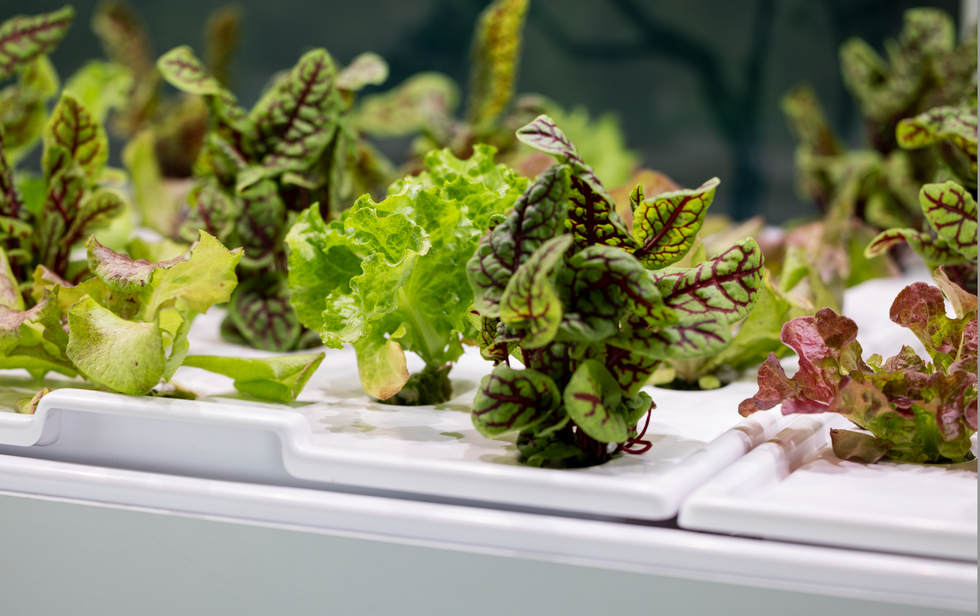
The chef-farmers can choose from 45 types of herb and leafy-greens seeds.
Courtesy Babylon Micro-Farms
Any system connected to the Internet of Things is also vulnerable to hacking; if CEA grows to the point where “there are many of these similar farms, and you're depending on feeding a population based on those, it would be quite scary,” Dara says. And there are privacy concerns, too, in systems where imaging is happening constantly. It’s partly for this reason, says Babylon’s Ratte, that the company’s in-farm cameras all “face down into the trays, so the only thing [visible] is pictures of plants.”
Tweaks to improve AI for CEA are happening all the time. Greenswell made its first harvest in 2022 and now has annual data points they can use to start making more intelligent choices about how to feed, water, and supply light to plants, says Gupton. Ratte says he’s confident Babylon’s system can already “get our customers reliable harvests. But in terms of how far we have to go, it's a different problem,” he says. For example, if AI could detect whether the farm is mostly empty—meaning the farm’s user hasn’t planted a new crop of greens—it can alert Babylon to check “what's going on with engagement with this user?” Ratte says. “Do they need more training? Did the main person responsible for the farm quit?”
Lowman says more automation is coming, offering greater ability for systems to identify problems and mitigate them on the spot. “We still have to develop datasets that are specific, so you can have a very clear control plan, [because] artificial intelligence is only as smart as what we tell it, and in plant science, there's so much variation,” he says. He believes AI’s next level will be “looking at those first early days of plant growth: when the seed germinates, how fast it germinates, what it looks like when it germinates.” Imaging all that and pairing it with AI, “can be a really powerful tool, for sure.”
Scientists make progress with growing organs for transplants
Researchers from the University of Cambridge have laid the foundations for growing synthetic embryos that could develop a beating heart, gut and brain.
Story by Big Think
For over a century, scientists have dreamed of growing human organs sans humans. This technology could put an end to the scarcity of organs for transplants. But that’s just the tip of the iceberg. The capability to grow fully functional organs would revolutionize research. For example, scientists could observe mysterious biological processes, such as how human cells and organs develop a disease and respond (or fail to respond) to medication without involving human subjects.
Recently, a team of researchers from the University of Cambridge has laid the foundations not just for growing functional organs but functional synthetic embryos capable of developing a beating heart, gut, and brain. Their report was published in Nature.
The organoid revolution
In 1981, scientists discovered how to keep stem cells alive. This was a significant breakthrough, as stem cells have notoriously rigorous demands. Nevertheless, stem cells remained a relatively niche research area, mainly because scientists didn’t know how to convince the cells to turn into other cells.
Then, in 1987, scientists embedded isolated stem cells in a gelatinous protein mixture called Matrigel, which simulated the three-dimensional environment of animal tissue. The cells thrived, but they also did something remarkable: they created breast tissue capable of producing milk proteins. This was the first organoid — a clump of cells that behave and function like a real organ. The organoid revolution had begun, and it all started with a boob in Jello.
For the next 20 years, it was rare to find a scientist who identified as an “organoid researcher,” but there were many “stem cell researchers” who wanted to figure out how to turn stem cells into other cells. Eventually, they discovered the signals (called growth factors) that stem cells require to differentiate into other types of cells.
For a human embryo (and its organs) to develop successfully, there needs to be a “dialogue” between these three types of stem cells.
By the end of the 2000s, researchers began combining stem cells, Matrigel, and the newly characterized growth factors to create dozens of organoids, from liver organoids capable of producing the bile salts necessary for digesting fat to brain organoids with components that resemble eyes, the spinal cord, and arguably, the beginnings of sentience.
Synthetic embryos
Organoids possess an intrinsic flaw: they are organ-like. They share some characteristics with real organs, making them powerful tools for research. However, no one has found a way to create an organoid with all the characteristics and functions of a real organ. But Magdalena Żernicka-Goetz, a developmental biologist, might have set the foundation for that discovery.
Żernicka-Goetz hypothesized that organoids fail to develop into fully functional organs because organs develop as a collective. Organoid research often uses embryonic stem cells, which are the cells from which the developing organism is created. However, there are two other types of stem cells in an early embryo: stem cells that become the placenta and those that become the yolk sac (where the embryo grows and gets its nutrients in early development). For a human embryo (and its organs) to develop successfully, there needs to be a “dialogue” between these three types of stem cells. In other words, Żernicka-Goetz suspected the best way to grow a functional organoid was to produce a synthetic embryoid.
As described in the aforementioned Nature paper, Żernicka-Goetz and her team mimicked the embryonic environment by mixing these three types of stem cells from mice. Amazingly, the stem cells self-organized into structures and progressed through the successive developmental stages until they had beating hearts and the foundations of the brain.
“Our mouse embryo model not only develops a brain, but also a beating heart [and] all the components that go on to make up the body,” said Żernicka-Goetz. “It’s just unbelievable that we’ve got this far. This has been the dream of our community for years and major focus of our work for a decade and finally we’ve done it.”
If the methods developed by Żernicka-Goetz’s team are successful with human stem cells, scientists someday could use them to guide the development of synthetic organs for patients awaiting transplants. It also opens the door to studying how embryos develop during pregnancy.
This article originally appeared on Big Think, home of the brightest minds and biggest ideas of all time.

